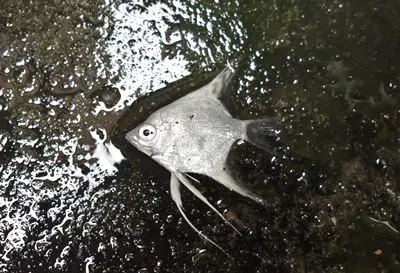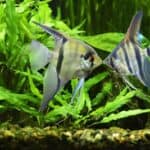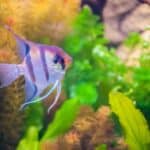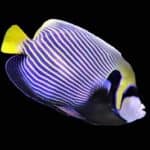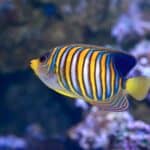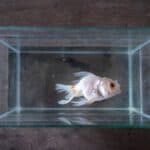When it comes to sudden angelfish death, the reasons for their demise are broad.
These tropical fish require a heated and filtered tank with regular maintenance. If you fail to meet the specific requirements of angelfish, they can die easily.
Angelfish can die from poor tank conditions, water changes, stress, and disease. These factors can cause fish to die with little or no warning.
If the water hardness is off or no conditioner is used, this can be life-ending. You may introduce new fish too quickly or pair them with the wrong tank mates.
In some cases, fish are sick before they arrive in the tank. They’ll only get sicker if kept in a fishbowl or overfed.
Even healthy fish will struggle in a tank without hiding places or having too little space. All this leads to stress, chemical imbalances, and fighting.
Why Do Angelfish Die So Easily?
In the wild, there are hundreds of thousands of angelfish that thrive. However, certain breeds are becoming endangered because of changes in ocean temperatures and conditions.
Pet angelfish face troublesome tank conditions, including the following:
- Too small tanks.
- Overcrowding.
- Improperly filtered.
- Creatures that stress angelfish or cause them to fight.
- They lack the right amount of oxygen.
These factors can lead to angelfish dying without warning.
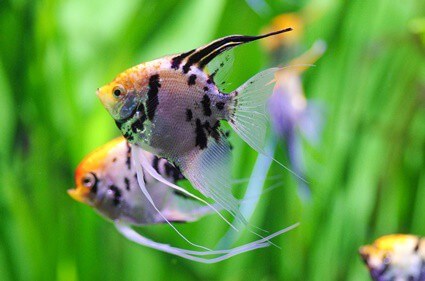
Why Do My Angelfish Suddenly Die?
Angelfish can appear to die suddenly. Sometimes, this will be within hours, with no warnings. At other times, the cause of death is a growing problem that has gone unnoticed until the fish has passed.
It’s frustrating, but there are many potential reasons why angelfish die, including the following:
- Old age.
- Starvation.
- Injury.
- Stress.
- Water pollution.
- Suffocation.
- Diseases.
- Parasites.
How can you catch these problems before they get lethal? Here are ways your fish might die suddenly.
Angelfish Died Overnight
If your fish died within a single night, this may have two causes:
Introduced To The Tank Suddenly
All new fish must be given time to acclimate to a tank. Otherwise, they will die from shock. Once you get the fish home from the pet store,
- Do not remove the fish from the bags.
- Float these bags in the tank for 15-20 minutes. This allows the fish to become accustomed to the tank’s temperature.
- Add small amounts of the tank’s water to the bag. This allows the fish to acclimate to the tank’s hardness and acidity.
- A difference between the bag and the tank’s water may require a slower acclimation. You may need up to 30-40 minutes.
- Quarantine new fish in a separate tank for 2 weeks. This allows the fish to acclimate in peace. It also prevents previously unknown diseases or parasites from entering the main tank.
Water Imbalance
A chemical imbalance is the primary reason for angelfish to die overnight. If new fish are introduced to this, it’s a sudden shock to their system. They won’t recover from it. They will show no immediate signs but die within a few hours. If your fish is hardy, it may even take all night.
Tanks that aren’t set to the correct parameters can also be a catalyst for a secondary problem. Let’s ensure your tank is right so you don’t suddenly kill your fish.
| Tank Size | 20 gallon + 15 gallons for each additional fish |
| Temperature Range | 78° F – 84° F |
| pH Range | 6.8 – 7.8 |
| Hardness | 54 – 145 ppm |
Aside from that, you should consider:
- Is the filter’s output gentle enough that the fish aren’t exhausting themselves?
- Is all the equipment functioning correctly?
- Has the temperature changed suddenly?
- Have I added new water without letting it adjust?
All My Angelfish Keep Dying
Diseases, fungal infections, and parasites can appear seemingly out of nowhere. While most show symptoms in your fish, others may go unnoticed. Without your intervention, they’ll rapidly get out of control and infect all new fish.
Closely inspect any ailing or dead fish. Are there any abnormal growths? These may include:
- Patches of missing scales or skin.
- Fluffy-looking growths.
- Rotten flesh or fins.
- Specks of white.
Angelfish, in particular, are vulnerable to ich, Hexamita, and cottonmouth. These are parasitic infections that often grow unchecked. You should also look for:
- Bloating.
- Weight loss.
- Inflammation of the gills and mouth.
Using a list of observable symptoms should narrow down the culprit. Most aquarium diseases can be resolved with quick action and the proper medication.
Angelfish Died After Changing Water
Did your angelfish die after you changed the water? Then, you need to look at how you are performing water changes:
- Are you using a water conditioner? If not, you should. These neutralize the chlorides and other purifying chemicals found in our water. Otherwise, they burn the delicate gills of the fish.
- Temperature-match the new water. A sudden temperature change can put the fish into shock.
- Don’t disturb the substrate or gravel. As you pour in water, this can kick up debris and fecal matter.
- Don’t change all the water at once. The water must be given time to properly rebalance (with you monitoring the chemical changes as you do). This is done easier when you change a little at a time.
Angelfish Keep Dying, But Water Is Fine
What if you checked all the water parameters, and the fish are still dying? If the water isn’t at fault, the issue may lie with the fish.
Are The Fish You Bought Unhealthy?
Not all fish breeders and sellers care about producing healthy fish. They may breed and sell sickly, weak, or injured fish en-mass. That will result in you bringing home that fish and watching it die unnaturally fast. Carefully observe the fish you intend to purchase.
- Does it appear healthy and well-fed?
- Is it behaving normally?
- Does its current holding tank look healthy?
- Is it old?
There’s nothing wrong with perusing online to double-check your sources. The aquarium shop or online vendor should have some information available. Customer reviews are a goldmine when trying to spot poor business practices.
Are The Tank Mates Compatible?
Angelfish are known for being feisty. However, when housed with compatible tank mates, angelfish aren’t likely to kill other fish – or each other.
That makes properly researching the fish that share a tank with your angels important. If you pick wrong, everyone involved may get killed in the resulting conflicts.
Angelfish can be both prey and predator. Large African cichlids and Oscars will prey upon angelfish. Male angelfish are also more likely to fight with each other.
Are The Fish Stressed?
Stressed angelfish can both hurt themselves and be more susceptible to illness. Multiple factors can stress a fish out, including:
- Incompatible tank mates.
- A tank that’s too small.
- Mating season.
- A lack of hiding places.
Another issue is at fault if you’ve determined the water is okay. Observe the fish.
- Is it darting around the tank?
- Is it swimming up and down along the glass sides?
- Is it hiding all the time?
- Does it appear to be frantic?
Then, it is likely stressed. You should try to give it more hiding places, a bigger tank, or try to prevent mating.
Can Angelfish Die From Over-Feeding?
Fish will eat themselves sick, so it’s up to you to ensure they are provided with the correct amount of food. Over-feeding fish can result in:
- Impaction.
- Constipation.
This will cause all sorts of problems in angelfish. You may notice the fish looking bloated or swimming abnormally if it is being over-fed. Likewise, over-feeding may result in excess waste in the tank. This can cause bacteria colonies and algae to grow out of control.
Look at the type and amount of food you are providing the angelfish. If it’s freeze-dried or dehydrated food, consider pre-soaking it in the water. This stops it from bloating in the fish’s stomach. The same concept applies to flake and pellet food types.
Only provide the fish with enough food to be eaten in 2-3 minutes. Any food that’s left over should be removed and disposed of. You can also begin including cooked peas or brine shrimp in their diet. These help with digestion.
Can Angelfish Survive In Cold Water?
As tropical fish, angelfish prefer warm waters. Although they will tolerate colder waters, they thrive in temperatures between 78° F – 84° F. To do this, you need a heater to maintain consistency.
Tanks that are too cold will see two things happen:
- The angelfish will appear sluggish and inactive.
- They will struggle to digest food properly.
This will see the fish dying off as their bodies clog with undigested food. That will lead to bloating and constipation, which can cause death within days. A cold tank may even cause the fish to freeze to death.
Angelfish can tolerate small sessions with cooler water. For example, you may temporarily remove the fish from its tank for cleaning. Gradually acclimate it back to tropical temperatures to avoid shock.
Can Angelfish Survive In Hard Water?
Angelfish can tolerate water hardness outside of their ideal range. However, if this difference becomes severe, health problems will arise.
It is best to keep the hardness and acidity between 54 – 145 ppm and 6.8 – 7.8, respectively. You should only keep a different hardness if you’re accommodating the needs of other fish species. It should still be approached with caution.
There are plenty of home testing kits that you can purchase to test your water. You can bring a sample (ideally, a full cup) of the water into an aquarium shop. Most will offer free or cheap water testing services. They can also test for a broader range of parameters.
Can Angelfish Survive Without A Filter?
Technically speaking, an angelfish can survive without a filter on its tank. However, this is risky. That’s because filters offer two primary functions:
- Removing waste from the water
- Agitating the surface
Both are vital for angelfish unless specific requirements are met. Experienced fish keepers may choose not to use a filter on certain tanks. This is only applicable when:
- The tank gets weekly water changes of at least 20%.
- The tank is heavily planted and produces adequate oxygen for the fish.
- An air pump is in use.
- The tank has a small population and bio-load.
Of course, maintaining an unfiltered tank is a lot of work. The angelfish will likely die if you avoid keeping up with the waste and oxygen levels. An unfiltered tank also reduces the fish you can keep in the aquarium. You can only afford to have a limited bio-load in this case.
Can Angelfish Survive Without Oxygen?
Angelfish cannot survive without oxygen. That’s because they are classed as water-breathing fish. As described by Fish Physiology, it means that the gills are the primary site for gas exchange.
Angelfish are not labyrinth fish and thus can’t breathe gaseous air. They rely on oxygen that’s extracted from the water through their gills.
When there is a lack of oxygen dissolved in the water, angelfish will suffer hypoxia. This will lead to their body shutting down. Angelfish can survive a maximum of 12 hours without oxygen in the water.
To prevent this, aquariums need to dissolve oxygen into the water. This is done either with:
- An air pump.
- A filter that creates surface agitation.
You can also use plants to oxygenate the water. However, you should know that plants will only produce this gas if certain conditions are met. If you’re trying to switch your tank into a self-sufficient ecosystem, a lack of oxygen may be why the fish are dying.
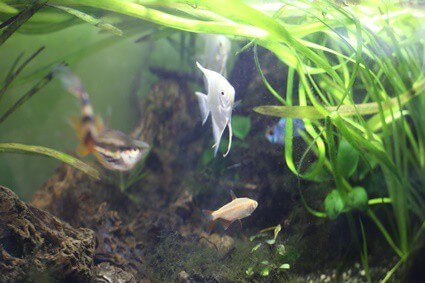
How Long Can Angelfish Survive Without Food?
Angelfish are a tropical fish with a relatively fast metabolism. As such, adults and juveniles must be fed 2-3 times a day. A morning and evening feeding is ideal. Ensure you’re feeding your fish enough food, the correct type of food, and that all fish are getting enough.
Angelfish will usually succumb to starvation in over a week if not fed. Juveniles and fry will last half that time if they are lucky. As you can imagine, starving to death is slow and unpleasant.
Anyone going on vacation or a work trip can get by with slow-release foods. These last for up to 2 weeks.
Can Angelfish Survive In A Fishbowl?
Fishbowls aren’t an ideal aquarium for any fish, let alone angelfish. This species needs plenty of space, even if housed without companions.
Fishbowls are also hard to attach heaters and filters, which angelfish requires. Angelfish will not survive long in a fishbowl and shouldn’t be housed in one.
- A single angelfish needs, at minimum, at least a 20-gallon tank.
- Ideally, one angelfish should have a 30-gallon tank.
- Increasing the number of angelfish in the tank will mean upsizing the tank by 15 gallons per fish.
Fishbowls are only suitable for dwarf shrimp if the bowl is large enough. Even betta fish cannot live happily in a fishbowl and require a 5-gallon tank.
Why Did All Of My Fish Die At The Same Time?
Discovering that all your fish have died in one fell swoop is horrifying. A broad and sudden loss of all life in the tank usually points to several problems.
Broken Heater
There are horror stories of cheap or old heaters exploding and “cooking” the fish.
Sadly, this does happen from time to time. Usually, you’ll notice a very unpleasant smell before the worst happens. You’ll feel an uptick in heat by touching the water with your hand.
Investing in a quality water heater is worth the investment. You may need to replace it every 5 or so years.
Water Problems
Improper water conditions may eventually kill all the fish at once. This includes everything from:
- Too much ammonia and waste.
- To a lack of oxygen.
- To a build-up of nitrates.
Not cleaning the tank regularly also leads to this filth collecting in the filter and substrate. Should this muck be disturbed, it can release into the water and kill the angelfish.
Always treat water being added to the tank and perform regular water changes. These water changes should also only result in 20-40% of the tank’s water being replaced.
Shock
Angelfish can go into shock when the water temperature suddenly changes. Even making the water slightly too cold or hot water can shock the fish.
So, don’t pour warm water into the tank if your heater stops working and the fish are cold. Get a new heater and slowly allow it to bring the temperature back to normal over several hours.
Improperly Cycled Aquarium
Be sure to allow a new tank to cycle for 3-4 weeks before adding fish. This allows the nitrogen cycle to begin. This process is crucial. It’s where harmful ammonia becomes even more toxic nitrites, which become benign nitrates. Without this cycle in place, harmful toxins are left in the water.
This will continue to build in deadly quantities. Adding fish before the cycle has formed will almost certainly kill the fish.
How To Keep Angelfish Alive
Like all fish, angelfish need consistent care and maintenance. If you want to avoid any sudden deaths, the best approach is to:
- Set the tank to the correct parameters.
- Change the water regularly but with care.
- Feed your angelfish on a precise schedule.
- Watch out for signs of illness or infection.
- If sickness appears, separate and treat your fish.
- Invest in appropriate filtration, heating, decoration, and plants.
- Choose tank mates carefully.
With these basic steps, you can lower the chances of your angelfish suddenly dying. As a plus, it’ll make your watery friends a lot more comfortable in their new home.

